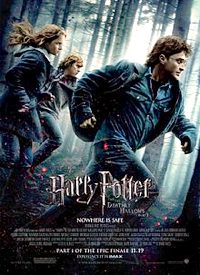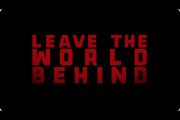
Part one of Harry Potter and the Deathly Hallows is incredibly entertaining and exciting, but far too mature for younger audiences. The film really proves that the characters (as well as the actors) have grown up, and as they age, the external and internal pressures increase dramatically.
Harry (Daniel Radcliffe) finds himself in a race to seek and destroy Horcruxes — according to Wikipedia on Harry Potter, a Horcrux is an object in which a Dark wizard or witch has hidden a fragment of his or her soul for the purpose of attaining immortality — and on the way uncovers the existence of three of the most powerful objects in the wizarding world: the Deathly Hallows. As Harry is learning of the Deathly Hallows for the first time, his archenemy, Lord Voldemort (Ralph Fiennes), is on the path to capturing them. In the wrong hands, the Deathly Hallows could bring the wizarding world to its knees.
Voldemort, aware that Harry is all that stands between himself and his evil plans, sets his cohorts on him, thwarting Harry, Hermione (Emma Watson), and Ron (Rupert Grint) from their exploits to find the Horcruxes.
While Harry is heavily guarded by characters with which Harry Potter fans should be familiar, including Dobby (Toby Jones) and Rubeus Hagrid (Robbie Coltrane), he remains in grave danger, particularly as the Ministry of Magic is infiltrated by the Dark Lord and his minions.
Like previous Harry Potter films, the atmosphere is often dark, somber, and melancholy. This film seems to go a step further, however, as it involves more graphic death scenes and a minor torture scene.
However, the storyline — in typical Harry Potter fashion — manages to capture a bit of levity, even in some of the darkest moments. For example, in preparation for an onslaught of Lord Voldemort’s demonic minions, Harry’s friends must all drink a potion that will turn them into Harry’s clones. Harry’s friends did not miss the opportunity to poke fun at his clothes, his height, and his terrible eyesight, provoking laughter from Harry as well as from moviegoers.
As was the case in previous Potter films, the scenery is breathtaking, the acting is superb, and the storyline is captivating. Additionally, the special effects are awe-inspiring, and the score adds harmony and emotion to the film.
To be frank, the Harry Potter films capture everything that is missing in the Twilight film series. While the Potter films were produced in the span of a decade, the Twilight movies were created in seemingly record time. First and foremost, by taking an appropriate amount of time to create the films, the casting director Harry Potter recruited actors with talent. Likewise, each installment has a believable and interesting dialogue, likeable characterization, a storyline that increases in depth as it progresses, as well as the ability to build viewer anticipation that almost brings fans to their knees as they await the next installment.
A striking element of this particular film, however, is the increased sexuality. Harry and Ginny Weasley are a bit more public about their feelings for one another, and as such, Ginny feels rather comfortable asking Harry to zip up her dress, presenting her bare back to Harry (and to moviegoers). The scene is quite intimate, particularly as she turns around to seemingly show her appreciation for his valiant zipping, and kisses him softly. Likewise, Ron is often jealous of what he perceives to be affections between Harry and Hermione that go beyond platonic. Seizing upon this weakness, the Horcruxes taunt him with images of Harry and Hermione, embracing and kissing passionately, and by all appearances, naked.
Perhaps the most striking element in the film is the parallels to fascist and Marxist regimes. As the Ministry of Magic is infiltrated by demonic powers who intend to rid the wizarding world of “halfbloods” (half mortals/half wizards) and create the perfect race of wizarding creatures, one cannot help but draw connections to Adolf Hitler or American eugenicists such as Margaret Sanger. The powers that be are disgusted by the very idea of “halfbloods” breeding with “fullbloods,” believing “halfbloods” to be of far lesser stock.
When the Ministry of Magic is infiltrated, one of the very first actions of the infiltrators is to create something like a “re-education camp” under the guise of education reform. They also discuss restoring the “temple for tolerance," and ask each resident of the wizarding world to submit themselves for evaluation. They defend these demands by asserting that the residents should have “nothing to fear if [they] have nothing to hide.” (Sounds like something the U.S. Transportation Security Administration would say.)
The similarities between the Ministry of Magic and well-known tyrannical leaders like Hitler, Mao, and Stalin are prominent.
Perhaps what makes this aspect of the film so surprising is J.K. Rowling’s public adoration of progressive leaders like Barack Obama and Hillary Clinton.
Harry Potter and the Deathly Hallows, Part One is an enigma, in that it is thrilling while very little seems to take place. For the most part, Harry, Hermione, and Ron are in hiding, though they do find themselves confronted at times by cronies of the Dark Lord.
It goes without saying that some Christians may be offended by the magical elements and absence of God from the films. According to the Christian and family-oriented website MovieGuide.org, which evaluates movies not only on their theatrical and entertainment quality but on their moral and spiritual values as well, the latest Harry Potter movie presents a mixed worldview. The MovieGuide review notes that the film includes "a rejection of using magic and witchcraft for control and power," but that "the ‘heroes’ also use magic and witchcraft, including wands and spells, to protect themselves from and hide from the villains who believe ‘Magic is might.’ "
As expected, the film ends right in the middle of things, and Part Two will not be released until June of next year. Word is it’s going to be very dramatic and bittersweet. Likewise, many fans have celebrated this most recent installment, as it is said to present the best interpretation of the novels yet.
Overall, the film was thoroughly enjoyable, though geared for older audiences.




